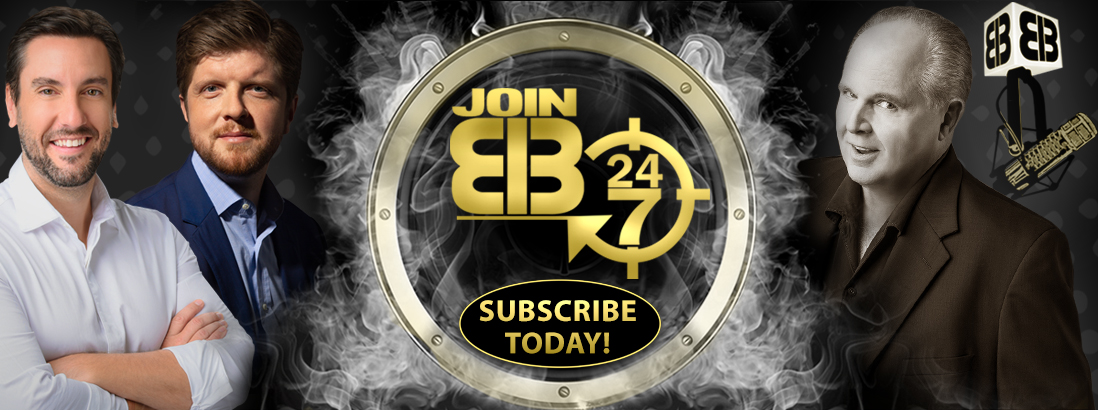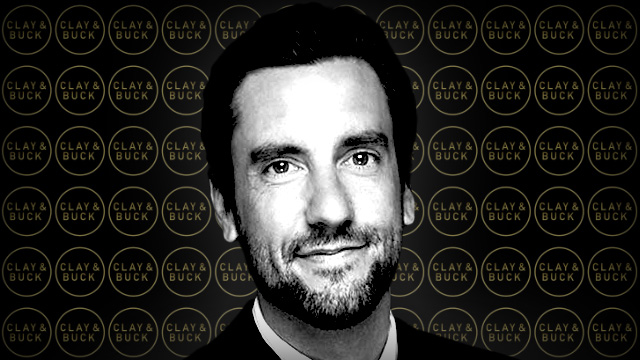Conservatism Is Compassionate
13 Dec 2021
Archive [December 1999]
For as long as I’ve been behind the Golden EIB Microphone, I’ve been telling you: Liberalism is the most gutless choice you can make. It requires nothing of you. All you have to do is agree with everything. You don’t have to think; you only have to feel. You don’t have to fix problems; you only have to talk about them.
Simply express solidarity with victims. Talk morosely about suffering and voila, in the world of liberalism, you are compassionate. Say the right words about the have-nots, the downtrodden, the oppressed, the forgotten, the left-behind, the underprivileged and the unhappy — or just mention them — and you can leave them where they are.
In fact, you must leave them where they are. Otherwise, what would liberals use to blame capitalism, blame society, blame America?
To be compassionate in the liberal universe, you don’t have to do anything. Except, of course, bend over and grab the ankles as your fellow compassionate libs come in search of your wallet. Liberalism requires “funding,” after all, which being translated from the original Soviet means the money must be confiscated. This is only fair, according to the liberal formulation, since the suffering masses they champion were created by heartless capitalism.
Don’t believe me? In one of his recent neo-socialist “Third Way” speeches, Bill Clinton celebrated the “reviving center-left political parties throughout the world, as people everywhere struggle to put a human face on the global economy…”
As I’ve said many times, a liberal defines compassion as to how many people are “helped” by government; a conservative defines compassion as to how many people no longer need it. Liberalism says: “I’m here to help you; you can’t make it without me.” Conservatism says: “I did it; this is how I did it; I know you can do it, too.” Liberalism wants “a human face” that hides its relentless push for control; conservatism wants human freedom.
The distinction is critical. Conservatives understand that liberalism’s “compassion” is not generous at all. In fact, it is ultimately far too stingy: federal handouts can’t compare with the vigorous generosity with which one provides for oneself and one’s own family.
Of course, liberals call that … “greed.” This is why the brand of compassion advanced by liberals is inherently pessimistic. It is condescending. It is demoralizing. It is a seductive trap. And ultimately, it is antithetical to liberty. President Clinton revealed this very clearly last January in Buffalo, when he said: “We could give it all [the budget surplus] back to you and hope you spend it right,” but he wasn’t going to. After all, he said, you might not protect Medicare! You might not save education! You might not fix global warming! Obviously, only he and his fellow liberals can ever be trusted to “spend it right.”
It is a dangerous lie. And it is the quintessential, central, arrogant argument of liberalism — which must be rejected, repudiated, and defeated. As the Cato Institute’s Stephen Moore says, “It is an iron rule of politics that no one in government is ever compassionate with their own money.”
Now the reason this terminology is on the table at this time, of course, is thanks to Gov. George W. Bush, who is campaigning for the presidency as a “compassionate conservative.” The governor has explained that his term “puts a compassionate face on a conservative philosophy, which our party needs to do because we have been labeled … in a wrong fashion by the current Administration — as uncaring people.”
This whole discussion of “compassionate conservatism” has caused some consternation. Few in the political world much like it. Many on the right reacted to Gov. Bush’s self-description as a “compassionate conservative” by asking: “Compassionate as opposed to whom?” It reminded many of us of 1988, when the governor’s father, then the Vice President, announced his Presidential intentions declaring that he would be a “kinder and gentler president.” To which it is said Ronald Reagan responded: “Kinder and gentler than whom?”
Likewise, many conservatives have reacted defensively — or derisively to the term “compassionate conservative.’’ Conservative writer David Frum dismisses it thus: “It combines the left’s favorite adjective with the right’s favorite noun.”
The left, on the other hand, is contemptuous, believing that the only conservative is a mean conservative. By definition (theirs), all conservatives are racist, sexist, homophobic, you know.
“America needs something better than compassionate conservatism,” Vice President Gore has said. “We need an approach that will take this country forward, not backward; and not only forward but also upward.” Conservatives, of course, only go backwards.
In Dec. 1998, in a keynote address to the Democratic Leadership Council — before either he or Bush had officially entered the race — Algore said: “Compassion is more than a pretty word. There is a long road between rhetoric and results.”
The Vice Perpetrator also charged: “Republicans serenaded mom and apple pie, even as they vetoed Family and Medical Leave twice — leaving mom to struggle without security when a baby needed her care … We [Democrats] see that it is too damn hard right now to pay the bills and juggle daycare and spend time with your kids.”
At the time, political analyst Stuart Rothenberg thought this was real smart. He lauded Algore’s political skill in making a direct attack on the “great, weak underbelly of the Republican Party,” that Republicans don’t “care about the middle class and the underclass. That they’re in it for the fat cats.”
That was then. Now, of course, Gore has been reduced to jeremiads to his own party that Bill Bradley is about to destroy Medicaid.
Still, I know that many of you have been put off by the “compassionate conservative” stuff. As you recall I, too, took issue with Gov. Bush’s approach some months back. When I perceived some of his comments, including his “compassionate conservative” label, as hostile to mainstream conservatives, I was quite vocal in my criticism. My remarks were excerpted in National Review: “He’s really wandered off the reservation here lately, folks. In my mind, no conservative running for President would make the kind of statements that he’s made. No conservative running for President would leave his philosophical brothers and sisters dying on the congressional battlefield the way Bush did … He’s done it twice in seven or eight days time … This obviously is a carefully crafted strategy … What it means is that solid conservatives from Tom DeLay to Dick Armey, who are doing all they can to eke out small majorities and beat back Clinton and all his Big Government schemes — issue after issue — end up being emasculated by Bush’s comments … Who wants a Republican moderate as president?”
But I was responding to the media’s portrayal that inaccurately characterized the governor’s comments as having been aimed at Congressional Republicans. They were not.
The point is, my argument is not with Gov. Bush. The fact that the political world is debating his formulation, his self-description, is a credit to his political effectiveness. He is driving the agenda; he setting the terms of the debate; he is choosing the subject. He is on offense. He put it on the table; it is unavoidable. There isn’t a news outlet that hasn’t covered compassionate conservatism, in depth.
“On this ground,” the governor says, “I will make my stand.” Fine. I leave it to him to do so. He says, “I know some belittle this language about ‘compassionate conservatism,’ but I want people in our country to know that the conservative philosophy is going to lead to a better and more compassionate tomorrow.” On that, we have no argument.
My argument is with liberalism. And more specifically, with its latest, insidious incarnation, Clintonism.
In the Great Debate of the twentieth century — the size and scope of government — conservatives appeared to win it all, on points. On crime, on the military, on the budget, on welfare. Communism was in the dustheap. On October 13, Dick Armey told the Heritage Foundation: “I can honestly tell you that, more than at any time in my life, our ideas and policies are on the rise.” As Ramesh Ponnuru writes in National Review, “Nobody believes in the planned economy, or wage and price controls, anymore; the budget is in surplus, inflation low, welfare reformed. The movement for school choice is enjoying its first halting successes. Almost as many Americans are now willing to call themselves ‘pro-life’ as ‘pro-choice.’”
A slam dunk, right? These sweeping trends had become so unarguable by 1995 that the Great Focus-Grouper himself felt the need to go before the country and announce in his State of the Union address: “The era of big government is over.”
But like everything else, he didn’t mean it, and victory was declared way too soon. For there is, naturally, a liberal translation of that sentence: “The era of big government is over; long live the era of big government.” Thus the Great Debate of this century on the size and scope of government will also be the Great Debate of the next. (Now we know what Bill Clinton’s bridge to the 21st century really means.)
Which is why I say my argument is not with the terminology of the right but with the ideas of the left. All of them. Although the Democrats’ defense of Clinton’s crimes has sapped his party’s intellectual power, snapped its underpinnings and broken it from its moorings, we cannot ignore the infection it also brought the country. As New York Times columnist Maureen Dowd writes, the Clintons are “like a virus or alien that needs a host body to survive. They’ve invaded our national psyche and we’re going to have to keep living with their weird marital problems and tangled ambitions forever and ever. Their business will never be finished. They are never going to go away because they have no place else to go … [T]hey will also be in our faces, exhausting us with their ‘We want to do good so we can break the rules when we need to’ ethos.”
Completely correct. And not only the Clintons, but Clintonism, is the pathogen; America is infected. That infection is what my argument is with. We already know what liberal “compassion” for the underclass did. It destroyed its values. But as a nation we seem perfectly willing to accept liberal “compassion’ for the middle class — as promised in the sweet, siren song of government largesse.
In an important piece in National Review, Ramesh Ponnuru writes: “Clinton was able to go on offense over the issue of government activism for the middle class … Clinton proposals on health, education, child care, etc., gave voters something at every stage of their lives, from cradle to grave. Government activism was … supporting the values of family and security — a strategy I’ve dubbed ‘values statism.’ It is this solicitude for middle-class values and interests, and not a reputation for compassion toward the downtrodden, that is behind the success of Clintonian liberalism.”
He is right. Bill Clinton himself told a Democratic dinner that his precious Third Way is “a common sense application of old-fashioned Democratic and American values to the challenges of the moment.” American values! Hardly. At least they didn’t used to be. But now, to far too many Americans, the government is a retirement plan and a health care program. That’s not what the Founders of this nation had in mind.
But Bill Clinton has great expectations. He even asks: “Can the whole Third Way be applied to long-term problems before they have emerged, such as Social Security, Medicare and climate change?” Ponnuru explains just how much damage the virus of Clintonism has already done:
“Take modem health care. Through a complex array of policies, the federal government and state governments have been socializing costs for years. Since this causes costs to explode, health-care administrators feel increasingly compelled to contain costs by discouraging some behaviors (such as smoking tobacco) and encouraging others [such as euthanasia and abortion). Thus does public policy promote the replacement of the old morality by a new one. And this is to say nothing of the financial fraud and the whiny sense of entitlement that these policies also abet… [T]he welfare state has undermined traditional virtues, and not just among the underclass…”
My argument is with Nanny State liberals — and with so-called conservatives and former conservatives who have in the last year or so slowly given up on the idea of limited government. Look at the Republican governors — they’ve had great success, but they have also been spending liberally on health care, education, child care. Whose priorities are those? Look at the Republican Congress, accused over and over again of “slashing,” “cutting,” “destroying” the safety net. Fact is, since 1995 they’ve actually spent over $500 billion more than Clinton asked for.
Bill Clinton claims: “We believe in activist government, but highly disciplined.” That appears, sadly, to be the motto of more and more Republicans. It is the seduction of Clintonism — a temptation we must not fall for.
Why, when the chains of welfare are at long last loosening, would we trade one set of shackles for another? Why, when socialism has been so thoroughly discredited, do many embrace it in another guise? The results are always ultimately the same: punishing the achievers; equalizing the misery; demoralizing everyone.
This is what I fight. The battle is still being waged, and I will wage it every day on my program. I champion limited government, without which freedom is impossible. I also champion rugged individualism, without which progress is doomed. These ideas may be fading from favor, but they will never fade from my program. The truth remains: freedom gives rise to strength. We know this because it is our history. It is the American birthright.
This philosophy is often contemptuously dismissed by liberals as “anti-government.” It is not. It is supportive of government — in its properly defined role. Defined, brilliantly, by the Founders.
Their great, and risky, idea was self-government: the people are sovereign. They knew it is freedom which allows the people to be compassionate. Government can never be compassionate. Government can be just — when bound by the rule of law.
Conservatism understands that the reason compassion is necessary is often because overweening, out-of-control government is the problem. Limited government is the compassionate relief to unleash the energies of a free people, the most important thing government can do is — get out of the way.
Conservatism is the essence of compassion. Why? Because conservatism is right — correct — in its assessment of human nature, the nature of governments, power, and the nature of the world. The most compassionate thing you can do is tell the truth. Liberalism — and Clintonism especially — is fundamentally dishonest.
It is conservatism that seeks to preserve the traditions and institutions that make the country great; it is conservatism that seeks to defend the people who make the country work. It is conservatism that is optimistic, energizing, confidence-building. Conservatism is full of good cheer.
And here is why: “We hold these truths to be self-evident, that all men are created equal, that they are endowed by their Creator with certain unalienable rights, that among these are life, liberty, and the pursuit of happiness — that to secure these rights, governments are instituted among men, deriving their just powers from the consent of the governed.”
That’s as compassionate as it gets.
Happy holidays.

Recent Stories

De Blasio Imposes Vaccine Passport Mandate In NYC test
This is an excerpt that Jaime updated. ffffffffffff

Buck Draws Heat For Speaking Truth About Simone Biles
I just wanted to establish what the current president was saying back on ABC News in March to George Stephanopoulos about his feelings on Governor Cuomo.






